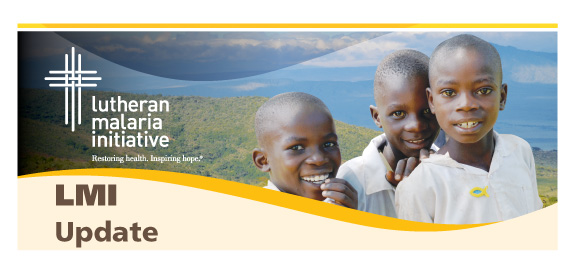By Martha Mitkos
In June, members of the Lutheran Malaria Initiative (LMI) team joined staff from the United Nations Foundation (UNF) and the United Methodist’s Imagine No Malaria campaign in Washington, D.C., for an advisory meeting.
LMI currently provides 30 percent of its malaria funding to the Global Fund to Fight Aids, Tuberculosis and Malaria (GF). The funds help increase the effort in countries where we are working to end malaria deaths. Jacob Fiene, manager of LCMS Health Ministry, helps our church partners access GF dollars for malaria education, prevention and treatment. By helping our partners establish relationships and secure funding, LMI’s work can continue after all of the U.S.-based funding (money donated by individuals, congregations and schools) has been depleted. Dr. Christoph Benn, GF’s director of external relations, said he appreciates the organization’s partnership with LMI and Imagine No Malaria. He said that under the GF’s new funding model, a more sustainable, simpler and faster way has been created for partners to access funds for their malaria work.
The GF’s newly adopted goal aims to reach 85 percent of the people in countries where it works. This will be accomplished through rapid diagnosis, treatment and prevention. “You can interrupt the transmission of the disease by reaching this goal,” Benn said. While the GF and the Johns Hopkins Global Program on Malaria’s primary focus is to provide access to insecticide-treated bed nets, LMI’s approach works through our church partners on education and prevention methods. LMI assists church partners in getting access to additional resources in their own countries. For example, we know there are far-flung communities in Africa that do not have access to bed net distribution locations or voucher programs that are already being offered by each country’s government.
This is truly a global fight. Why is LMI’s approach unique? Our work is done in communities where church partners are actively reaching out to spread the word about malaria but also the Gospel of Jesus Christ. We help our partners reach out with Christ’s hand of mercy.
Who else is part of the worldwide effort to end malaria deaths in Africa? Between 50 and 55 percent of European countries indicate they will maintain or increase their funding despite a global fiscal crisis. Additionally, Japan, Australia, South Korea, India, China and Saudi Arabia are continuing to support malaria prevention and eradication programs at their current levels. Corporations also are providing funding. A few of them include: Apple, $50 million; Project Red, $200 million; and Chevron, $50 million.
What are the funding needs for the future? Michael Pajonk, director of organizational partnerships with the United Nations Foundation, said that in order to reach the GF’s goal, $15 billion is needed over the next five years.
So why is $10 million from LMI so vital? Because LMI, through our church partners, has access to last-mile communities that do not typically have access to governmental resources. Pastors and teachers in these communities are respected and able to mobilize congregants and community leaders to action. They endorse health workers who educate the public on malaria prevention and treatment, teach malaria signs and symptoms, provide access to insecticide-treated bed nets, rapid testing kids and medication, and monitor and evaluate their proper use. And more importantly, through LMI, the door is opened to continued opportunities to serve and share Christ.
— Martha Mitkos is the director of LMI for the LCMS.
(This article appeared in the September issue of the LMI Update.)





